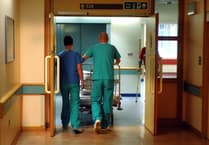When I visited Farnham Waitrose earlier this month to see the brilliant community work they do, I had my chancellor’s hat on as well as my local MP hat. Because a supermarket is a very good place to see for yourself the short-term pressures facing our economy.
Whether it is the increase in food prices (up 13 per cent in the past year, even higher than the overall inflation rate) or the challenges of hiring staff, supermarkets are at the coalface of the economy.
And if there is one thing I could do to help them, it is to bring down inflation.
Technically this is the responsibility of the governor of the Bank of England. But in reality Andrew Bailey has only one tool with which to bear down on inflationary pressures, namely interest rates.
A chancellor can make a big difference to inflation through fiscal changes – in other words, the amount of money the government puts into the economy through taxing and spending.
Why does the battle against inflation matter so much? Firstly because it wreaks havoc on family finances. People can see the cost of their weekly shop go up alongside energy and petrol bills.
Inflation also destroys industrial relations as unions fight for inflation-proof pay rises (as we are seeing) but employers worry about inflationary spirals.
It reduces investment by businesses in the economy because the one thing investors want is certainty.
And it scares pensioners and savers who see the value of their retirement pots insidiously eroded.
Thankfully the Office for Budget Responsibility says our plan will more than halve inflation in the next year. Some have commented that it was going to happen ‘anyway’ but that is not true.
The OBR was only able to make such a forecast because we took extremely difficult decisions in the autumn statement to increase tax and reduce spending.
That gave markets sufficient confidence to reduce our country’s borrowing costs to below what they were around the time of the ‘mini-budget’.
Even more importantly it allowed the Bank of England to reduce expectations as to how interest rates would be likely to go.
What we are not doing is saying we will not help the patient while the medicine is being taken. In fact we are doing the opposite: supporting families with £99 billion of help this year and next to help with higher bills.
That includes an average of £900 off this year’s bills, inflation increases in benefits and the national living wage and additional payments to welfare claimants, pensioners and disabled people.
To those who say is not a very ‘Conservative’ thing to do I say this: no party has a monopoly on compassion but compassion is not free. If we had not reduced the deficit by 80 per cent ahead of the pandemic, where would the funding have come from?




